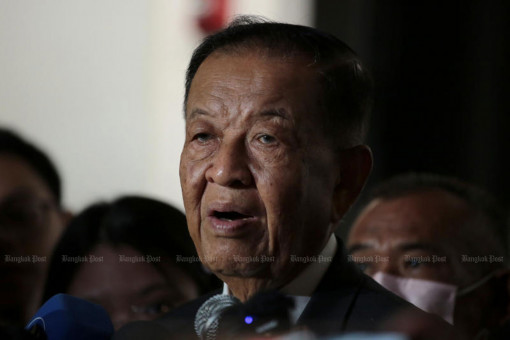PUBLISHED : 22 Jul 2023 at 06:11

House speaker Wan Muhamad Noor Matha on Friday defended his decision to call a vote on whether Move Forward Party (MFP) leader Pita Limjaroenrat could be renominated for prime minister.
Mr Wan came under fire from the MFP and the Pheu Thai Party for allowing lawmakers to settle the dispute surrounding Mr Pita’s renomination by a vote instead of making a ruling.
The majority rejected Mr Pita’s renomination on the grounds that parliamentary meeting regulation No.41 prohibited the resubmission of a failed motion during the same parliamentary session unless new circumstances were factored in.
They argued that an earlier motion regarding Mr Pita’s nomination had already been rejected by parliament on July 13, when he failed to get the needed majority of votes in the first round.
Mr Wan said he listened to the MPs and senators discuss the matter for several hours during the July 19 session, and none of them showed there were new circumstances to be considered.
“When there are new circumstances, I can make a ruling. But when no one pointed out how the circumstances had changed, I was unable to do so,” he said.
He said he accepted criticism but insisted that he was doing his job impartially and in accordance with regulations. He also said the MFP had the right to ask the Constitutional Court to rule if the parliament resolution was constitutional if they disagreed.
According to Mr Wan, a letter has been issued calling for a joint meeting of MPs and senators on July 27 to select a new prime minister, while MPs and senator whips would meet on July 26.
Atthajak Sattayanurak, a lecturer at Chiang Mai University’s Humanities Faculty, issued an open letter to Mr Wan asking him to address the “flawed” decision he made before the next round of voting for a prime minister.
The academic echoed the views of Borwornsak Uwanno, the former chair of a constitution drafting committee, saying that invoking a parliamentary session regulation undermined the constitution and this must be addressed before setting an “ugly” precedent.
“You must be the one who fixes it by announcing before lawmakers that the vote on July 19 was against the constitution and correct it before the next session,” he said.

